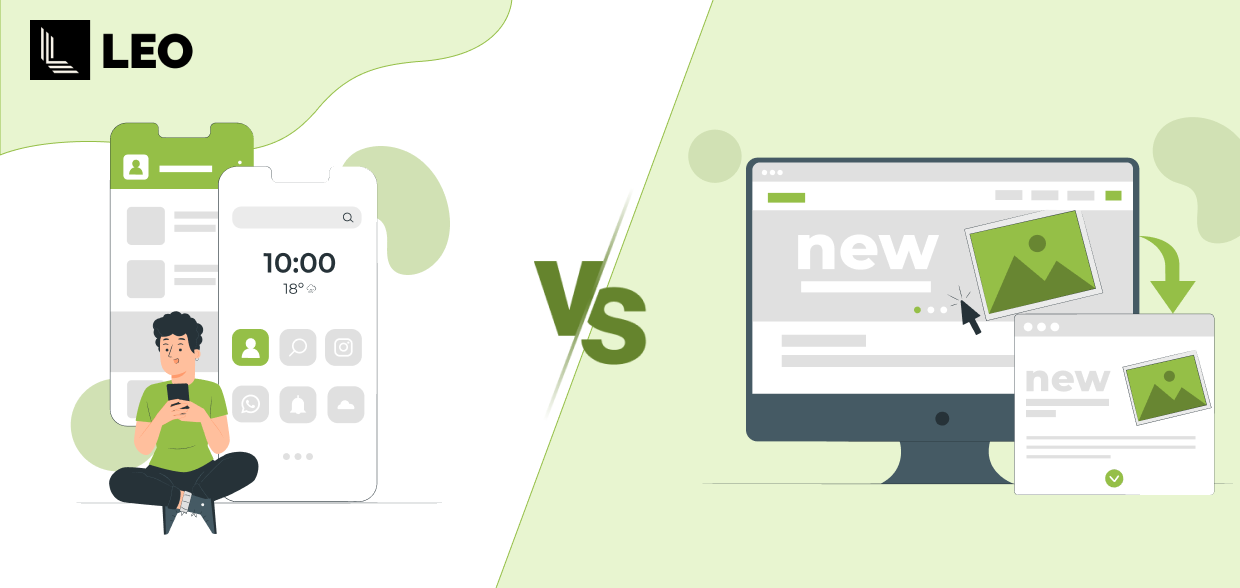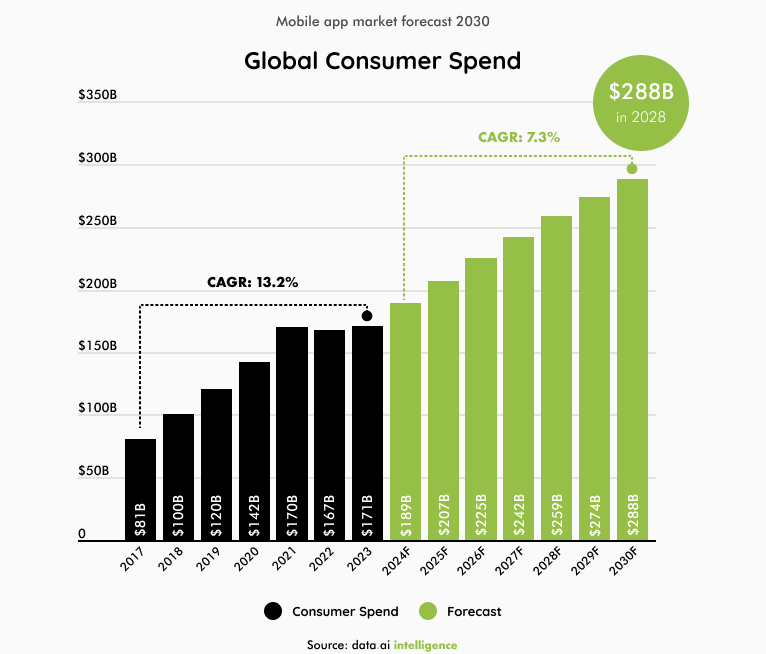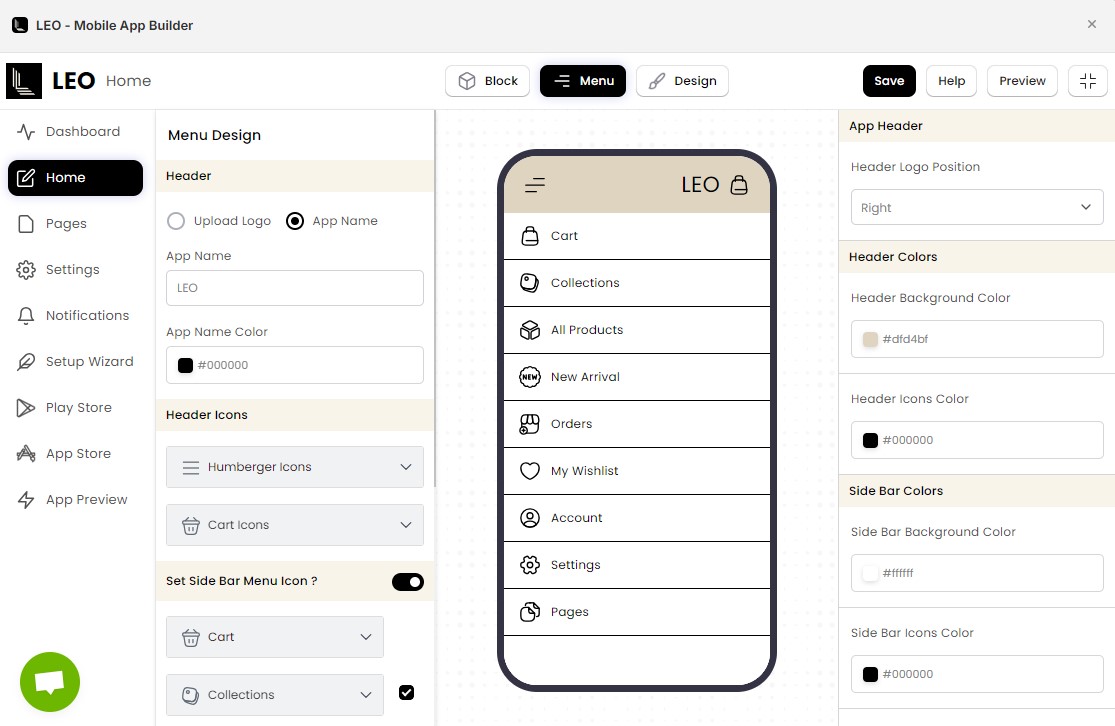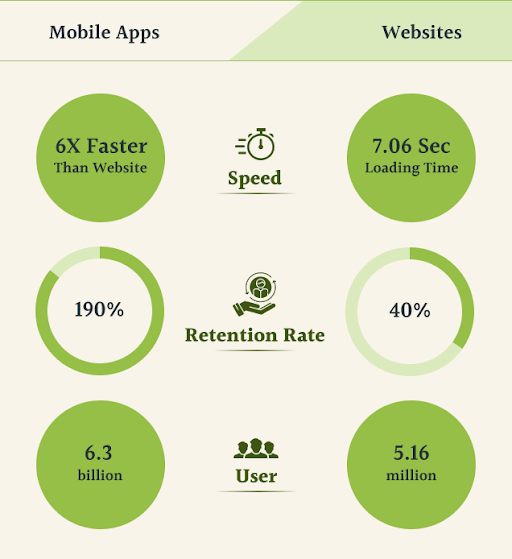Mobile App Vs Website: What’s The Great Choice To Expand Business?

Online shopping predominantly occurs through apps and websites, with mobile devices being the preferred choice for consumers worldwide. When considering which platform is beneficial for your business, it's essential to conduct research. While larger businesses may not face significant constraints, those with limited budgets must choose between the two options
This article aims to assist in decision-making by outlining each option's advantages, drawbacks, and key factors. To make an informed decision that best suits your business needs, let's delve into the details and explore the options available. Let's begin our learning journey.
What's A Mobile App?
Mobile apps are one type designed by software companies to download on smartphones and tablets. Devices download applications. While some apps require an internet connection, others do not. Several software companies develop apps for their products, like Salesforce or Microsoft Teams, to enable users to access their software on mobile devices.
Some apps can be downloaded for free while some are premium or freemium. Applications (apps) manage to offer users high-quality services and experiences even though they are often little software units with restricted functionality.
The two leading platforms are the Google Play Store and the Apple Store. The Google Play Store boasts 3.5 million downloadable apps, while the Apple Store offers 1.6 million apps.

What Is The Website?
A website is essentially a collection of web pages. The "web pages" are online pages that may be viewed on a PC or smartphone by connecting to the internet and using web services. For example, leoapps.io is a website on which you are presently using the internet to view this web page.
To open the website you need to search in search engines like Google, Bing, Yandex etc. 99000 search queries are searched every second by people on Google. So websites help drive traffic from search engines. Globally, 2 trillion searches are performed on Google every year. This is only for one search engine there are 1500 search engines of this type available globally.
Main Difference Between Mobile Apps And Websites
Mobile Apps |
VS. |
Websites |
|
A software app created especially for use on a mobile device is known as a mobile application. |
Definition |
A website is a collection of web pages. Users can access using the internet. They can be either static or interactive and are made up of multiple pages that are connected via hyperlinks. |
|
You have the flexibility to develop an app using platforms like Shopify, Cordova, or Sencha. However, to make it available for download on Android or iOS devices, you'll need to publish it on the Google Play Store or Apple App Store, respectively. |
Platform |
Anyone can create a website for their business on the internet. To create the website you need to have a domain or host. You can create websites helping Wix, WordPress, Shopify, Weebly, etc |
|
User can directly install the app on their device with instant access or without the internet. |
Access |
An active internet connection is required to access the website. |
|
Through a mobile app, you can provide limitless functionality for easy navigation. |
Functionality |
The website provides limited functionality. |
|
To develop the mobile app you need to hire an app development company or expert app developer team. Instant mobile app creation will be possible with a mobile app builder. |
Development |
If you are not able to develop you need to hire an expert developer or company. |
|
The app developer should have known about the following languages: Swift (iOS), Kotlin (Android), JS (React native), Java, Dart(flutter), etc. |
Knowledge |
Web developers should know the following languages for development:- HTML, CSS, PHP, Python, JS, Java, Ruby, and more. |
To know more about the differences between mobile apps and websites, keep reading on.
How Can You Build A Mobile App And Website?
Before starting on the development of a mobile app or website, it's imperative to craft a detailed plan. This plan should encompass aspects such as desired features, functionalities, objectives, target audience, and more. Once the app blueprint is in place, you can proceed with the development process. However, before launching, thorough research is essential to ensure that the app or website is optimized for user experience.
Let's go deeper into how to start the straightforward process of app and website development. Start from the app development guide!
Straightforward Steps For Developing Mobile Apps From Scratch
The mobile app is the best solution to boost your online presence and share your business worldwide.
-
Decide App Idea & Goal
-
Research Your Targeted Audience & Competitors
-
App Features And Functionality
-
Choose The Suitable Development Method
-
Test And Preview App
-
Publish The App On The Store For Download
-
App Promotion
In 2021, 230 billion mobile apps were downloaded, and this number reached 257 billion by 2023, according to Statista.
App design, UI/UX, and the 3-click rule these all things considered in the app idea. To create a successful app you need to set your goal for the app.
You must be aware of the distinction between an objective and a goal. Your desired end state is reflected in your goals. The actions you do to accomplish your goals are your objectives.
You must comprehend your target audience if you want to make sure that users get value from your mobile app. For most firms, their target audience consists of their current or potential clients. You may accurately determine the needs, desires, and common issues that your target audience is trying to solve by performing audience research and analysis.
An important and worthwhile step in the mobile development process is competitor research. Competitive analysis can offer important information that will make your mobile application development project much more successful.
After you've conducted research, you can easily determine the essential features of your app and identify any additional ones that might be missing. By incorporating these, your app can stand out prominently in the market. Enhancing navigation, providing update reminders, and scaling up business operations all require adding functionality and features to your app.
Several methods are available for mobile app development, such as hiring an app development company or utilizing a no-code app builder. However, after thorough research, you should have a clear idea of which development process is most suitable for your app. Here LEO Mobile App Builder will help to create apps for Android or iOS in less than 60 minutes.
Upon completing the app development process, it's crucial to thoroughly test all app features, speed, and performance to ensure they are functioning correctly. If any issues arise during this process, it's imperative to address them promptly. Only when all issues are resolved should you proceed with publishing the app on the app store.
After all necessary processes are completed, it's time to consider the app release phase. The app publishing process can be somewhat intricate, requiring thorough preparation. To reach a broader audience, consider publishing your app on multiple platforms, such as the Google Play Store and the Apple App Store.
Publishing on the Apple App Store costs $99 annually, while on the Google Play Store, you'll only need to pay a one-time fee of $25.
To get more downloads and users you need to prompt your app on various platforms. Social media, in-app ads, paid ads, and ASO can improve app traffic.
Bonus:- Build Mobile App Without Coding Within A Day With LEO Mobile App Builder
If you're looking to quickly develop a mobile app to kickstart your earnings, the ideal solution lies in a Mobile App Builder. This tool facilitates app creation without the need for coding, thanks to its intuitive drag-and-drop interface.

In the market numerous app builders are available but LEO Mobile App Builder provides stand-out features. Its features aimed at enhancing the user's shopping experience, including:
- Readymade app layout design
- Pre-built sections for drag-and-drop
- Push notification
- Product filters and wishlist
- Discount and coupon
- Multiple currencies
- Area verification
- App analytics
- Preview app features
- Live chat support
- Customer support

Steps To Build a Website
-
Define The Purpose Goal Of The Website
-
Choose The Suitable Website Builder
-
Find An Attractive Theme & Template
-
Customize Template
-
Add Necessary Pages
-
Create Sitemap And Robots.txt File
-
Add Relevant Content
-
Buy A Domain, And Hosting To Publish A Website
-
Solve A Technical Issue
-
Promote Website
Before starting website creation, the initial step is determining what value you aim to deliver to your users. Define your business objectives for building the website. What goals do you aim to achieve through the website? This clarity will guide subsequent decision-making steps.
To build the website you need to select the right website builder which allows the website development process and completes all requirements. Wix, WordPress, Mailchimp, Weebly etc are just a few examples. According to the research, WordPress is the best website builder in the market.
At this step, choose a well-designed theme that keeps users long time on your website. If you are not satisfied with the web builder's theme you can integrate a theme or template from another platform like Themeforest, Templatemonster, etc. There will be free and premium themes choose the right one that is sufficient for you.
Themes provide numerous customization possibilities, enabling you to personalize your site extensively. You can utilize these options to adjust elements such as size, colour, content and font style, as well as add or remove menus to elevate the site's visual appeal.
You'll need to add relevant pages. Lots of templates are provided with pre-built templates or the option to add extra. Common pages are contact, about, services, products, privacy policy, terms, and FAQs.
If your website lacks a sitemap or a robot file, it's essential to create them first. A sitemap functions as a site index and is mandatory for Google.
You need to provide complete information about your site on relevant pages or products. From that users can easily understand your site and what you offer (products/services).
The domain and hosting platform's premium plan covers both. Simply choose your platform, select the corresponding plan from their options, and publish your website online. Platforms like Bluehost, GoDaddy, and BigRock are among the choices available.
Additionally, optimizing speed enhances user experience and reduces bounce rates. Ensuring mobile responsiveness caters to the needs of mobile users.
To drive more traffic to your website you need to promote your website with multiple methods like SEO, Ads, Social media, and Google ads.
You can learn website website-building course in 60 minutes but you can't build a website in less than 60 minutes like a mobile app.
Which Programming Language You Should Have To Build A Website And App?
To develop a stunning mobile app you need to hire an expert developer or top app development company which knows the following programming languages, JavaScript, C++, Python, Swift, Java, Ruby, SQL, Kotlin, and Dart.
The only solution is a Mobile app builder that does not need coding or any programming languages for mobile app development.
For website development, you should know lots of programming languages such as HTML, JS, C++, Python, Swift, Java, Ruby, SQL, Kotlin, React, Angular, VueJS, PHP etc.
Pros Of Mobile App And Website
Here you can decide your solution by comparing the benefits of both.
Advantages of Mobile App
1. Enhance Communication Directly With A Customer
68% of buyers are prepared to spend more for companies that provide flawless customer service. In situations like this, mobile apps come in handy. Live chat and in-app messaging tools enable smooth contact between companies and their clients. This improves retention and cultivates a positive relationship between the two. Push notification is the best feature for sending personal notifications to users' mobile.
2. Improve Customer Interaction
Many individuals frequently access apps on their devices, leading to heightened interaction with brands compared to websites. User engagement through apps surpasses that of websites, with mobile apps offering user-friendly access, making them a preferred choice for online shopping by almost all users. Simple and plain mobile app design helps to more interaction.
3. Limited Cost High Profit
To publish mobile apps on the app store and app marketing costs are lower than a website. In mobile apps, you need to only pay for app publishing and marketing. Mobile apps drive more profit than websites.
4. Create Great Value For Business
To build a mobile app your business creates stand out volume in the competitive edge. Great value helps to improve brand visibility.
5. Unlock More Opportunities For Sales And Revenue
A mobile app stands as the optimal solution for boosting sales and revenue within businesses, unlocking avenues for growth. Moreover, mastering techniques to effortlessly boost ecommerce sales is entirely feasible.
6. Improve Productivity And Revenue
By creating mobile your business will generate more productivity. Up to 20% to 40% productivity increase by mobile app. Mobile apps account for 43.4% of all e-commerce sales by 2023.
In the fast digital edge customers in the 18-34 age range prefer apps for e-commerce purchases due to the proliferation of mobile apps.
7. Strong Brand Visibility
Users install well-designed and easy-to-use mobile apps on their devices. When users are shown or check your app again and again your business brand will be increased automatically.
8. Invite A Wide Range Of Global Audiences
Incorporating multilingual support and various currency options encourages global user engagement. With up to 70% of users utilizing mobile apps for online shopping, implementing an effective marketing strategy can significantly boost traffic and installations for your mobile app.
9. Mobilize Business Following The Trend
In today's modern trending landscape, it's essential to stay current and offer trendy tools to your users. By developing a mobile app, your business can effortlessly adapt and enhance the shopping experience, keeping pace with evolving consumer preferences.
Advantages of Website:
Provide detailed story via pages:- Through the website, you can share detailed info regarding pages, products and more. Users can easily know your business, history and related business.
Listed on search engines (Google, Yahoo others):- Create your website using search engine optimization (SEO) strategies to make it easier for visitors to find you when they're looking for relevant keywords. This could be a crucial first step toward growing your company.
Latest business updates news:- Maintaining blog pages allows you to share detailed information on various topics or the latest products and updates. Consistently posting blogs can rejuvenate your website with valuable tips and distinctive insights.
Business expands worldwide:- The traditional limits of business have all been disrupted by the internet. Using a website to connect with clients worldwide is quite simple.
Lots of benefits have both but, here you can easily look at the difference between app and website benefits.

Which One Should You Build First?
After looking at the image you will decide to create a mobile app. But here we will talk to you about reality. Your end goals will determine whether developing a mobile website or a native app is a better option.
If you want to develop an interactive game or ecommerce store will most likely benefit from the choice of the mobile app. Nevertheless, a website is a good option if your objective is to provide mobile-friendly material to as many people as you can.
Final Words!
In other words, the conclusion between mobile apps and websites isn't about choosing one over the other but rather understanding their exclusive strengths and leveraging them to fulfil your exact goals. While mobile apps offer a tailored user experience and enhanced functionality, websites ensure accessibility across various devices and platforms. Ultimately, the decision depends on factors such as your target audience, budget, and business objectives.
FAQ - Solution Of The Question Arising In Your Mind
- How long does mobile app development take from scratch to end?
- What do the audience prefer these days? Mobile app or website?
- What is beneficial to develop? Mobile app or website?
- What are the key considerations when developing a mobile app or website?
On average, mobile app development typically spans 6-9 months. Simpler apps may be completed in as little as 4 months, while moderately complex ones may take around 8 months. However, building complex apps requires more time. Yet, leveraging a mobile app builder can expedite the process if you aim to create an app swiftly.
According to our research people are more prefer mobile apps. 90% of people's mobile time is spent using apps. Why a mobile app?
In general, mobile apps outpace websites in terms of work speed. A feature-rich mobile app will propel your business to new heights, opening up endless growth chances.
Consider these factors Business purpose, goal, targeted audience and market, business type, budget, and features to determine whether a website or mobile app best suits your project needs.

